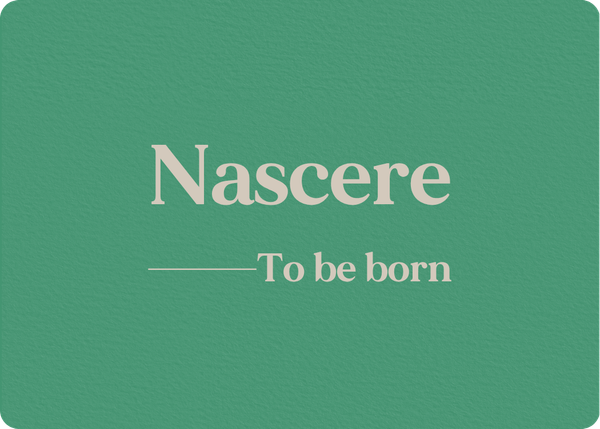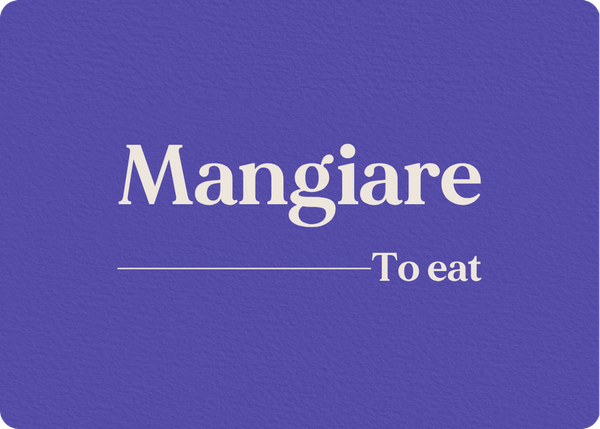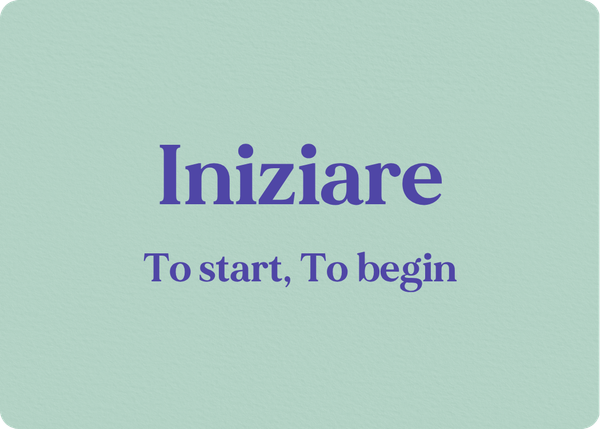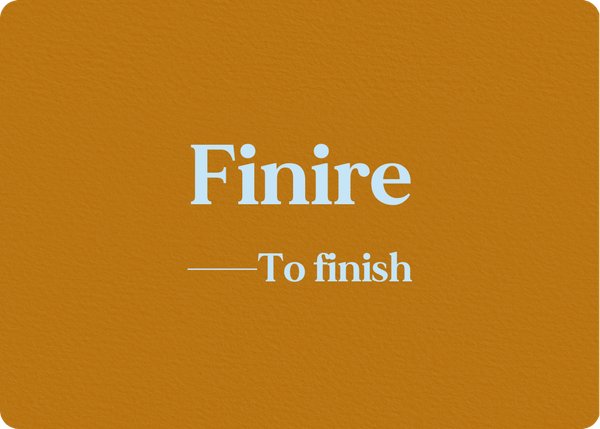What is Nascere?
Nascere is one of the most essential Italian verbs meaning "to be born", "to arise", or "to originate". It belongs to the second conjugation (-ERE verbs) and has some irregular forms. This fundamental verb is useful for expressing birth, origin, emergence, and beginning in Italian conversation and writing.
Key Features of Nascere:
- Type: Irregular second conjugation verb (-ERE) with some irregular forms
- Meaning: To be born, to arise, to originate, to emerge
- Irregularities: Simple past (nacqui, etc.), past participle (nato)
- Auxiliary verb: Uses "essere" (to be) for conjugation in compound tenses
- Past participle: Nato
Indicativo – Indicative Mood
Presente (Present Tense)
| Person | Conjugation |
|---|---|
| io | nasco |
| tu | nasci |
| lui/lei | nasce |
| noi | nasciamo |
| voi | nascete |
| loro | nascono |
Example:
Ogni volta che parliamo di politica nasce una controversia.
Every time we talk about politics, a controversy arises.
Passato Prossimo (Present Perfect)
| Person | Conjugation |
|---|---|
| io | sono nato/a |
| tu | sei nato/a |
| lui/lei | è nato/a |
| noi | siamo nati/e |
| voi | siete nati/e |
| loro | sono nati/e |
Example:
Mia sorella è nata nel 1995.
My sister was born in 1995.
Imperfetto (Imperfect)
| Person | Conjugation |
|---|---|
| io | nascevo |
| tu | nascevi |
| lui/lei | nasceva |
| noi | nascevamo |
| voi | nascevate |
| loro | nascevano |
Example:
In quella epoca nascevano molti artisti famosi.
In that era many famous artists were born.
Trapassato Prossimo (Past Perfect)
| Person | Conjugation |
|---|---|
| io | ero nato/a |
| tu | eri nato/a |
| lui/lei | era nato/a |
| noi | eravamo nati/e |
| voi | eravate nati/e |
| loro | erano nati/e |
Example:
Il dubbio era nato dopo quella conversazione.
The doubt had arisen after that conversation.
Passato Remoto (Simple Past)
| Person | Conjugation |
|---|---|
| io | nacqui |
| tu | nascesti |
| lui/lei | nacque |
| noi | nasciemmo |
| voi | nasceste |
| loro | nacquero |
Example:
Mozart nacque a Salisburgo nel 1756.
Mozart was born in Salzburg in 1756.
Trapassato Remoto (Past Anterior)
| Person | Conjugation |
|---|---|
| io | fui nato/a |
| tu | fosti nato/a |
| lui/lei | fu nato/a |
| noi | fummo nati/e |
| voi | foste nati/e |
| loro | furono nati/e |
Example:
Appena fu nato il progetto, tutti si misero al lavoro.
As soon as the project was born, everyone got to work.
Futuro Semplice (Simple Future)
| Person | Conjugation |
|---|---|
| io | nascerò |
| tu | nascerai |
| lui/lei | nascerà |
| noi | nasceremo |
| voi | nascerete |
| loro | nasceranno |
Example:
Da questa crisi nasceranno nuove opportunità.
New opportunities will be born from this crisis.
Futuro Anteriore (Future Perfect)
| Person | Conjugation |
|---|---|
| io | sarò nato/a |
| tu | sarai nato/a |
| lui/lei | sarà nato/a |
| noi | saremo nati/e |
| voi | sarete nati/e |
| loro | saranno nati/e |
Example:
Alla fine del mese, nostro figlio sarà già nato.
By the end of the month, our son will have already been born.
Congiuntivo – Subjunctive Mood
Presente (Present Subjunctive)
| Person | Conjugation |
|---|---|
| che io | nasca |
| che tu | nasca |
| che lui/lei | nasca |
| che noi | nasciamo |
| che voi | nasciate |
| che loro | nascano |
Example:
È importante che nasca una vera collaborazione tra di noi.
It's important that true collaboration emerges between us.
Passato (Past Subjunctive)
| Person | Conjugation |
|---|---|
| che io | sia nato/a |
| che tu | sia nato/a |
| che lui/lei | sia nato/a |
| che noi | siamo nati/e |
| che voi | siate nati/e |
| che loro | siano nati/e |
Example:
Credo che sia nata una grande amicizia tra Marta e Giorgia.
I believe that a great friendship has been born between Marta and Giorgia.
Imperfetto (Imperfect Subjunctive)
| Person | Conjugation |
|---|---|
| che io | nascessi |
| che tu | nascessi |
| che lui/lei | nascesse |
| che noi | nascessimo |
| che voi | nascesse |
| che loro | nascessero |
Example:
Voleva che nascesse un accordo tra le parti.
He wanted an agreement to emerge between the parties.
Trapassato (Past Perfect Subjunctive)
| Person | Conjugation |
|---|---|
| che io | fossi nato/a |
| che tu | fossi nato/a |
| che lui/lei | fosse nato/a |
| che noi | fossimo nati/e |
| che voi | foste nati/e |
| che loro | fossero nati/e |
Example:
Credevo che Dario fosse nato a dicembre!
I thought that Dario had been born in December!
Condizionale – Conditional Mood
Presente (Present Conditional)
| Person | Conjugation |
|---|---|
| io | nascerei |
| tu | nasceresti |
| lui/lei | nascerebbe |
| noi | nasceremmo |
| voi | nascereste |
| loro | nascerebbero |
Example:
Senza tutte quelle preoccupazioni, avresti vissuto meglio.
Without all those worries, you would’ve lived better.
Passato (Past Conditional)
| Person | Conjugation |
|---|---|
| io | sarei nato/a |
| tu | saresti nato/a |
| lui/lei | sarebbe nato/a |
| noi | saremmo nati/e |
| voi | sareste nati/e |
| loro | sarebbero nati/e |
Example:
Con più risorse, sarebbero nate infinite possibilità.
With more resources, infinite possibilities would have been born.
Imperativo (Imperative)
| Person | Conjugation |
|---|---|
| (tu) | nasci |
| (lui/lei) | nasca |
| (noi) | nasciamo |
| (voi) | nascete |
| (loro) | nascano |
Example:
Nascano nuove speranze nel vostro cuore!
May new hopes be born in your heart!
Indefinite Moods
Infinito (Infinitive)
- Presente (Present): nascere (to be born)
- Passato (Past): essere nato (to have been born)
Examples:
Vedere nascere l'alba è sempre emozionante.
Watching the dawn break is always moving.
Essere nato in una famiglia numerosa l'ha reso molto socievole.
Being born into a large family made him very sociable.
Participio (Participle)
- Passato (Past): nato (born) - also used as adjective or noun
Example:
È un attore nato, recita fin da bambino.
He's a born actor, he's been acting since childhood.
I nati nel 1990 sono considerati millennial.
Those born in 1990 are considered millennials.
Gerundio (Gerund)
- Presente (Present): nascendo (being born)
- Passato (Past): essendo nato (having been born)
Examples:
Nascendo in estate, ha sempre amato il caldo.
Being born in summer, he has always loved the heat.
Essendo nato in una famiglia di pianisti, ha sviluppato presto la passione per la musica.
Having been born into a family of pianists, he developed a passion for music early.
The verb Nascere at a glance: Key tenses you need
| Present | Present Perfect | Imperfect | Present Subjunctive | Imperfect Subjunctive | Present Conditional |
|---|---|---|---|---|---|
| io nasco | io sono nato/a | io nascevo | che io nasca | che io nascessi | io nascerei |
| tu nasci | tu sei nato/a | tu nascevi | che tu nasca | che tu nascessi | tu nasceresti |
| lui/lei nasce | lui/lei è nato/a | lui/lei nasceva | che lui/lei nasca | che lui/lei nascesse | lui/lei nascerebbe |
| noi nasciamo | noi siamo nati/e | noi nascevamo | che noi nasciamo | che noi nascessimo | noi nasceremmo |
| voi nascete | voi siete nati/e | voi nascevate | che voi nasciate | che voi nasceste | voi nascereste |
| loro nascono | loro sono nati/e | loro nascevano | che loro nascano | che loro nascessero | loro nascerebbero |
Conclusion
Mastering the conjugation of "nascere" is essential for expressing birth, origin, emergence, and beginning in Italian. This irregular second conjugation verb requires special attention to its irregular forms, particularly in the simple past and past participle.
Remember the key points:
- Uses "essere" as auxiliary verb in compound tenses
- Past participle is "nato"
- Essential for expressing birth, origin, and emergence
- Featured in many common expressions about luck and life circumstances, such as "essere nato con la camicia" (to be born lucky) and "non essere nato ieri" (don't be naive)
Keep practicing with real sentences and contextual examples to master this fundamental Italian verb!





